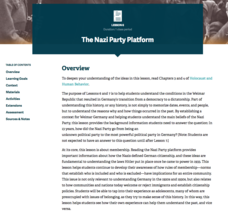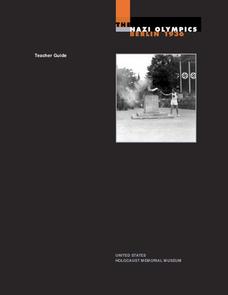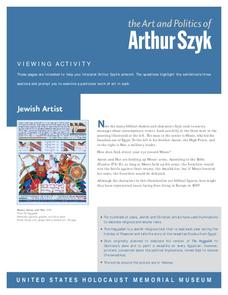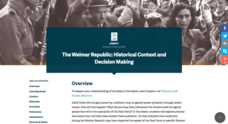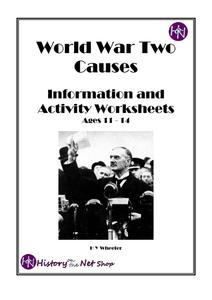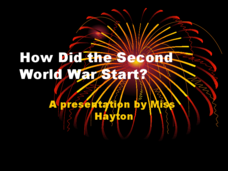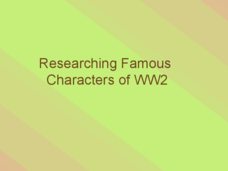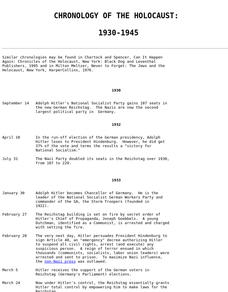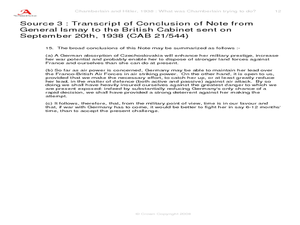US National Archives
WWII: Western Europe 1939-45 – Deception and Bluff
World War II left the British desperate for help in any form—including in the form of a magician! High schooler conduct research on Jasper Maskelyne, a stage magician who used his talents to deceive the Germans on the war front, before...
US National Archives
WWII: Western Europe 1939-45 – Battle of Britain
Had Britain not emerged as the victors of the 1940 Battle of Britain, World War II would have ended much differently—and the world as we know it would be catastrophically altered. Learn more about this pivotal moment that kept the Nazis...
US National Archives
WWII: Western Europe 1939-45 – Resistance and SOE
Germany seemed to be unstoppable in the early years of World War II, but the tireless and sacrificial work of the Special Operations Executive (SOE) helped to steer the war in another direction. After exploring primary source documents,...
US National Archives
WWII: Western Europe 1939-45 – Occupation
Warsaw, Poland, suffered much of the blunt of World War II—but according to Polish letters from the early days of Nazi occupation, other parts of the country were much worse off. High schoolers use the letters and contemporaneous...
US National Archives
WWII: Western Europe 1939-45 – Invasion
Without the benefit of history, Western Europe in the 1940's had no idea what was about to befall them. Class members use primary sources, including political cartoons, videos, and internal documents, to analyze how much of a threat...
Facing History and Ourselves
The Nazi Party Platform
Not all party platforms stay democratic. A resource covers many political issues in Germany during the time of World War II, and teaches pupils about the Nazi party platform and what went wrong. Individuals participate in a warm-up...
US Holocaust Museum
Nazi Olympics: Berlin 1936
The Olympics are about more than sports—at times, the games are also a place of racism and prejudice! Pupils investigate the 1936 Olympics in Berlin, Germany. They analyze the meaning behind the materials included in the United States...
US Holocaust Museum
The Art and Politics of Arthur Szyk
Have you ever listened to a song that had a deeper political meaning to it? Every examined a work of art with layers of meaning? Pupils analyze the drawings of Arthur Szyk. They research the deeper meaning of several artistic cartoons...
Facing History and Ourselves
Laws and the National Community
When it comes to the law, is justice always served? Teach scholars about how law sometimes enables prejudice of entire groups of people with a unit on World War II that includes a warm-up activity, analysis of primary sources,...
Facing History and Ourselves
The Weimar Republic: Historical Context and Decision Making
Did you know that way before Hitler became a dictator, he actually spent nine months in a German jail? Provide the background for the escalating point before the Nazi party took over in World War II through the exercises in the resource....
Facing History and Ourselves
Us and Them: Confronting Labels and Lies
Stereotyping and discrimination based on religion catalyze many atrocities in the world. Explain the awful treatment of Jews and the lies Nazis spread by using an informative yet sensitive resource. Learners participate in a warm-up and...
Core Knowledge Foundation
Genetics and the Master Race
How did the beginnings of genetic research influence the Nazi party? A thorough, engaging unit incorporates the work of Gregor Mendel, the study of inherited traits, and the use of racism and discrimination during the Holocaust.
H Y Wheeler History on the Net
World War Two Causes
If you're searching for a range of activities and worksheets on the subject of the onset of World War II, then this is the booklet for you. Featured topics include the signing of the Treaty of Versailles, Hitler's rise to power, the...
US National Archives
The Home Front: How Did People Prepare for the War at Home?
Wars have a profound effect not only on a country's soldiers, but also on the everyday lives of its citizens. Invite young historians to discover how Britain prepared for the second World War by analyzing a series of government posters...
Curated OER
How Did WWII Start?
How did the second world war begin? A presentation first looks at the political climate that led to WWI and the effects of that war. Then, it describes the reason Hitler was able to take hold of Germany after WWI and prior to WWII. The...
Curated OER
Researching Famous Characters of WWII
In collaborative groups, learners will research one of the three famous characters outlined in this presentation. The resource introduces Adolf Hitler, The Royal Family, and Winston Churchill, then asks each group to research and prepare...
Curated OER
Writing Exercises: World War II, #3
The class responds to three writing prompts focused on WWII. They describe the role Adolf Hitler played in the war, compare and contrast German and British views of the war, and explain the geographical scope of the war at its height.
Curated OER
A Chronology of the Holocaust
A straightforward chronology of the Holocaust lists events from 1930 to 1945. Connects to a page with links to extensive resources and information about the Holocaust. Use as a resource for student inquiry into the Holocaust.
Curated OER
Children and World War II
Intended for a younger audience, this presentation provides a very simplistic overview of the people and events key to World War II. They will be introduces to Hitler, Chamberlain, and Churchill, hear an audio piece, and see images from...
Curated OER
Hitler's Lightning War
When you line them up, you can knock them down. Hitler had a plan, carried it out, and started WWII. This presentation focuses on Hitler's military and political tactics, who he fought, and how his opponents fell. Key players and events...
Curated OER
Holocaust and Resistance
High schoolers complete a unit of lessons that examine the Holocaust from the point of view of those who actively resisted the Nazis. They analyze a timeline, participate in a class debate, explore various websites, and write a letter.
Curated OER
Chamberlain and Hitler, 1938--What Was Chamberlain Trying To Do?
Explore events prior to World War II. Learners view replicas of authentic photographs and hand written documents representing the viewpoints of Adolf Hitler and Neville Chamberlain. They discuss alternate viewpoints, consider historical...
Curated OER
Adolph Hitler
A collage of stark images from World War II compose the background of this presentation about Adolph Hitler. The infamous leader's childhood, rise to power, and eventual defeat are detailed in these slides, filling in many gaps that...
Curated OER
Italian Fascism
By first defining the characteristics and ideology of fascism, this presentation makes it easy for viewers to contextualize the rise of Mussolini in post-WWI Italy. Not only thorough and informative, the pictures and concepts featured in...







